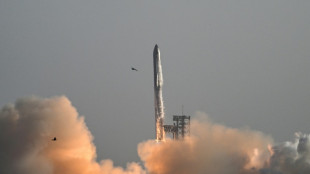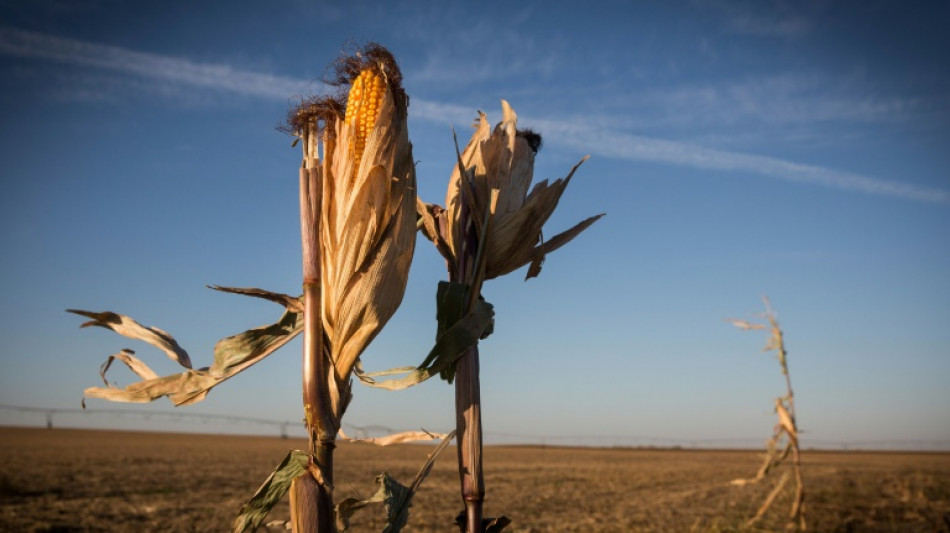
-
 Three in a row Piastri wins in Miami to lead McLaren one-two
Three in a row Piastri wins in Miami to lead McLaren one-two
-
Scheffler ties 72-hole PGA record in CJ Cup Byron Nelson romp

-
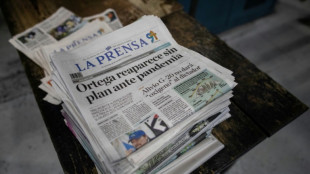 Nicaragua says quitting UNESCO over press prize award
Nicaragua says quitting UNESCO over press prize award
-
Oscar Piastri wins Miami Grand Prix to lead McLaren one-two

-
 Bednarek runs this year's world-best 200m to win at Miami Grand Slam
Bednarek runs this year's world-best 200m to win at Miami Grand Slam
-
'Lucky number seven' for Ruud after beating Draper to clinch Madrid Open

-
 China's Zhao leads Williams 11-6 in world snooker final
China's Zhao leads Williams 11-6 in world snooker final
-
Far-right candidate tops Romania's presidential rerun

-
 Ryu takes wire-to-wire win at LPGA Black Desert Championship
Ryu takes wire-to-wire win at LPGA Black Desert Championship
-
Marseille held by fellow Champions League hopefuls Lille

-
 'Lonely' Palou cruises to win at IndyCar Alabama Grand Prix
'Lonely' Palou cruises to win at IndyCar Alabama Grand Prix
-
Zelensky says does 'not believe' Russian truce pledge

-
 US Fed expected to pause rate cuts again, await clarity on tariffs
US Fed expected to pause rate cuts again, await clarity on tariffs
-
Ruud beats Draper to win Madrid Open and claim maiden Masters

-
 Far-right candidate leads Romania's presidential rerun
Far-right candidate leads Romania's presidential rerun
-
Parag's six sixes in a row, Pant flops in IPL

-
 Howe hails Newcastle's 'ruthless' Isak after VAR drama in Brighton draw
Howe hails Newcastle's 'ruthless' Isak after VAR drama in Brighton draw
-
Pant woes continue as Lucknow lose to Punjab in IPL

-
 'Thunderbolts' strikes big, topping N.America box office
'Thunderbolts' strikes big, topping N.America box office
-
Kompany player-led shake-up returns Bayern to Bundesliga summit

-
 Leverkusen draw hands Kane's Bayern Bundesliga title
Leverkusen draw hands Kane's Bayern Bundesliga title
-
Chelsea sink champions Liverpool, Man Utd crash at Brentford

-
 Bielle-Biarrey lifts Bordeaux past Toulouse and into Champions Cup final
Bielle-Biarrey lifts Bordeaux past Toulouse and into Champions Cup final
-
Chelsea beat champions Liverpool to boost top five push

-
 Hammers' Potter reveals Paqueta's tears of frustration at Spurs draw
Hammers' Potter reveals Paqueta's tears of frustration at Spurs draw
-
Lyon's Champions League hopes hit by loss to Lens

-
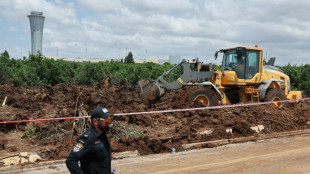 Israel vows retaliation against Iran, Yemen's Huthis over airport attack
Israel vows retaliation against Iran, Yemen's Huthis over airport attack
-
Man Utd 'need to change' after Brentford loss: Amorim

-
 China's Zhao dominates Williams 7-1 in first session of World Snooker final
China's Zhao dominates Williams 7-1 in first session of World Snooker final
-
Zelensky says does 'not believe' Russian truce promises

-
 Bielle-Biarrey double lifts Bordeaux past champions Toulouse and into Champions Cup final
Bielle-Biarrey double lifts Bordeaux past champions Toulouse and into Champions Cup final
-
Trump says 'I don't know' if must uphold US Constitution as president

-
 Brazil police foil Lady Gaga gig bomb plot
Brazil police foil Lady Gaga gig bomb plot
-
Godolphin in full bloom as Desert Flower wins 1000 Guineas

-
 Almeida wins Tour de Romandie as Evenepoel claims closing time-trial
Almeida wins Tour de Romandie as Evenepoel claims closing time-trial
-
Bolsonaro leaves hospital three weeks after abdominal surgery
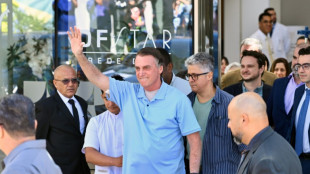
-
 Man Utd crash at Brentford, Isak rescues Newcastle
Man Utd crash at Brentford, Isak rescues Newcastle
-
Romanians vote in tense presidential rerun as far right eyes win

-
 Lyon see off Racing to set up Challenge Cup final against Bath
Lyon see off Racing to set up Challenge Cup final against Bath
-
Kolkata survive Parag's six-hitting blitz to clinch IPL thriller
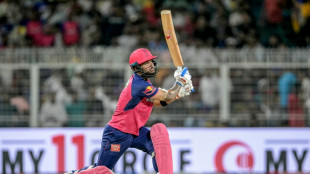
-
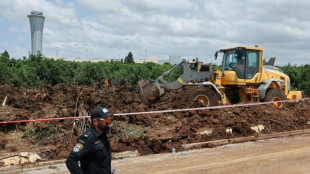 Israel vows retaliation against Yemen's Huthis over airport attack
Israel vows retaliation against Yemen's Huthis over airport attack
-
Mbappe maintains Real Madrid Liga dream in Celta thriller

-
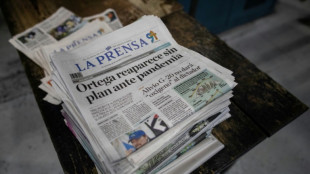 UNESCO says Nicaragua quitting over press prize award
UNESCO says Nicaragua quitting over press prize award
-
Church donation box goes digital in Greece

-
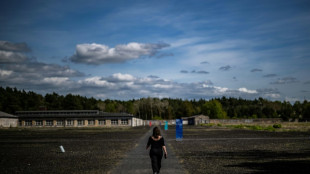 Germans mark liberation of Ravensbrueck Nazi camp
Germans mark liberation of Ravensbrueck Nazi camp
-
Missile hits Israel airport area in Huthi-claimed attack
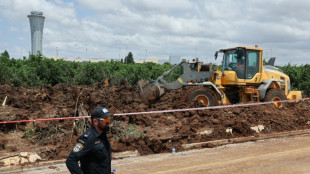
-
 DeChambeau eyes PGA Championship battle after South Korea LIV win
DeChambeau eyes PGA Championship battle after South Korea LIV win
-
Chinese president to visit Russia on May 7-10: Kremlin

-
 'We don't care': weddings go on in Pakistan's Kashmir border
'We don't care': weddings go on in Pakistan's Kashmir border
-
Missile hits Israel airport area in attack claimed by Yemen's Huthis


Farmers in US Midwest struggle amid prolonged drought
Months without rain have left farmers across the vast US Midwest, part of the country's essential "breadbasket," seeing crop yields in freefall, with some fields too damaged to harvest.
At the 4,000-acre (1,600-hectare) Tucker Farms in Venango, Nebraska, "we were only able to harvest... around 500" acres, most of it wheat, said Rachel Tucker.
Much of the rest had shriveled up under a relentlessly hot sun.
The drought has attracted grasshoppers, which threatened the flowers the Tuckers also grow -- until they brought in praying mantises to control the winged pests.
If the American West has been suffering through water shortages for years, the Midwest has not seen conditions this bad since 2012.
"It's even worse than 2012," said Tucker. "Much worse."
Her husband, whose grandfather farmed these same fields, says things have not been this bad since the so-called Dust Bowl days of the 1930s.
The story is just as grim to the south, in western Kansas.
"I was catching up with some older farmers this morning," said Marc Ramsey, whose family has farmed near the small town of Scott City for nearly a century.
"Guys that are in their 70s and 80s are saying, you know, they haven't even experienced anything like this in their lifetime. So it's pretty bad."
Rainfall has been almost nonexistent since late July, he said. Two inches "was all we've had, basically all year."
Rex Buchanan, director emeritus of the Kansas Geological Survey, said one thing seems different from the dry years of 2010-2012: "It seems like when the rain shut off, it just completely shut off."
- Dwindling groundwater -
Drought has hit the three major US crops: wheat, corn and soybeans, and the US Department of Agriculture recently had to lower its nationwide yield predictions.
Along With Kansas and Nebraska, the Midwestern state of South Dakota has also been hard-hit.
In normal times, these three states provide one-third of US winter wheat production, and one-fourth of the corn output.
Approximately 30 percent of Marc Ramsey's land is irrigated and, meaning that portion is doing better than his other fields. Tucker Farms' single irrigated field also fares better than the others.
But even some of Ramsey's irrigated fields are producing only 80 bushels of corn per acre, less than half the usual rate.
High levels of water usage have led to "pretty dramatic declines" in aquifers across western Kansas, Buchanan said, adding that farmers in some areas "have really struggled."
"They’ve seen some wells go dry. They’ve had to return to dryland farming," meaning without irrigation.
- 'You just worry' -
With water rights strictly limited, Buchanan said some farmers have banded together in agreements on more cautious use of subterranean water, drawing as much as 20 percent less than permitted.
Ramsey, like the Tuckers, carries crop insurance covering exceptional losses.
But a year like 2022 can push up premiums, which were already rising due to increased commodity costs.
Insurance "covers your cost of productivity, for the most part," Ramsey said. "And so we'll be here next year and try it again."
But insurance doesn't refill dwindling aquifers -- something that autumn rains usually take care of.
The lack of soil moisture "will be a concern going forward into winter and next spring without a change in what we are currently seeing," said Brian Fuchs, a climatologist with the National Drought Mitigation Center at the University of Nebraska-Lincoln.
Though Buchanan says that "there’s certainly an awareness (among farmers) about climate change," despite the political sensitivity of the subject in the United States.
Farming is always difficult and unpredictable work -- and in years like this, said farmer Rachel Tucker, "you just worry about the suicide rate."
"So I'm hoping that everybody can stay in high spirits, and hope for the best next year."
O.Karlsson--AMWN

